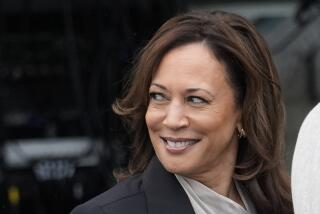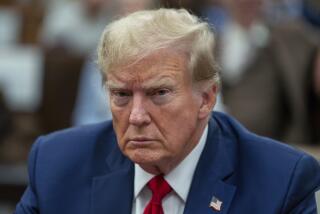The Comeback Dictator Who Has Clinton Reeling
- Share via
WASHINGTON — What made Jose Raul Capablanca, the Cuban who reigned as world chess champion from 1921-27, one of the game’s great masters was his uncanny ability to be 10 or more moves ahead of his adversary. He not only planned his own game; he also seemed to anticipate his opponent’s every move.
Today, Fidel Castro Ruz is the Capablanca of diplomacy. And for him, the trophy in his heretofore successful match with President Bill Clinton is nothing less than continued survival 35 years after his revolution seemed to have reached its end game. It would not be the first time that conventional wisdom misunderstood his calculation as foolishness.
Assaulting the dictatorship of Fulgencio Batista in the 1950s with a small band of companions seemed foolish, but Castro won out in 1959.
The Cuban leader repulsed the U.S.-organized Bay of Pigs invasion, allied himself with the Soviet Union and allowed Soviet nuclear missiles on his island in 1962. True, John F. Kennedy persuaded the Russians to withdraw the warheads--at the risk of a global nuclear war--but Castro gained from the adventure a non-invasion guarantee from Washington that protected him for decades.
In 1980, the Cuban leader defied President Jimmy Carter by unleashing the Mariel boat lift, which seemed unconscionable at the time. Yet, Castro not only cleansed his island of “parasites,” he also won an immigration agreement that allowed Cubans to apply to the U.S. mission in Havana for visas to the United States, thus formalizing a safety value for malcontents and political foes.
Later, he seemed to have lost his senses when he dispatched the Cuban army to fight in Angola, but his soldiers were victorious--and Castro became chairman of the non-aligned movement, the great chief of the Third World. In the end, the United States had to swallow its pride and negotiate with the Cubans, along with the Russians and the South Africans, to gain their departure from Angola. This time, Castro made himself appear a genius of diplomacy.
Today, deprived of Soviet aid and with his country, economically and socially, in a state of near collapse, the 68-year-old Castro is moving his chess pieces according to a pre-planned strategy designed to save him--or so he hopes--through concessions from Clinton.
Using fleeing Cubans as pawns, Castro knows Clinton must negotiate with him--not just over the wave of refugees headed toward the United States, but over what are basic aspects of the U.S.-Cuban political relationship, including the longstanding trade embargo. These are subjects Washington has refused to discuss since Dwight D. Eisenhower was President. Indeed, Castro is so sure of himself that he appointed his best diplomat and the third-most powerful man in Cuba--after himself and brother Raul--to meet in New York City with the U.S. delegation that, according to Clinton, only wishes to talk about immigration issues. The United States seems to have been caught off guard when it assigned just a mid-level State Department official to the talks with Ricardo Alarcon, president of the National Assembly, former foreign minister and long-time U.N. ambassador.
Naturally, Castro has a colossal ego. In the span of a few weeks, he has transformed himself from a down-at-the-heels, destitute Caribbean dictator--and international pariah--into a world figure again. At least for a time, he has ceased to be irrelevant.
The circumstances surrounding Castro’s appearances on the cover of Time magazine--one gauge of presumed public interest--best tell the story of the comeback Cuban. The first cover story, in 1959, portrayed him as the revolutionary hero. On Dec. 6, 1993, it was Castro’s “failed dream.” Last week, his eighth cover appearance, it was a stern Castro wagging his finger and asking: Ready to talk now?
With thousands of Cuban runaways imprisoned, in effect, in the U.S. Naval Base at Guantanamo Bay and with more crossing the Straits of Florida each day, Castro obviously has leverage. He is cynical enough to realize that it is easier and cheaper for him to let his people go than for the United States to cope with housing them in Florida or Guantanamo.
Clearly, it must never have occurred to White House planners that an imperiled Castro might fall back on his old habit of defying U.S. Presidents. It was not understood--and this is part of Castro’s chess-game approach--that he is perfectly happy to be rid of great numbers of people who, in his eyes, are parasites and oppose his revolution. He is not sentimental. He does not apologize for the state of affairs in Cuba. He sees advantage in the exodus.
What must be understood about Castro at this juncture is that his approach is absolutely consistent with his previous adventures with the United States. Each time, he has staked out a well-prepared position, then refused to budge. This is the result of three-and-a-half decades of studying U.S. politics, U.S. politicians and U.S. Presidents.
Clinton has not enjoyed similar study. Clearly preoccupied with such matters as Democratic Party politics in Florida, Haiti and health-care reform, the President has not had the time or the opportunity to understand--let along outthink--his Cuban opponent.
The wages of ignorance are evident. Clinton’s responses to the Cuban exodus--restricting charter flights, increasing anti-Castro broadcasts and forbidding Cubans in the United States to send dollars to relatives back home--have played into Castro’s hands. For example, cutting off dollar remittances, estimated to be $500 million a year, will only further reduce the level of living conditions in Cuba, thereby strengthening Cubans’ incentives to take to the seas in search of a better life--and put added pressure on Clinton to make a concession.
There’s no reason to believe that the crisis is near an end, especially since the volume of attempted crossings from Cuba was rising as the talks in New York got under way. The White House, so far, has no credible options to Castro’s policy of using disgruntled people as weapons in his quest for renewed world recognition and for the removal of U.S. trade restrictions against Cuba.
Mr. President, it’s your move.
More to Read
Sign up for Essential California
The most important California stories and recommendations in your inbox every morning.
You may occasionally receive promotional content from the Los Angeles Times.










